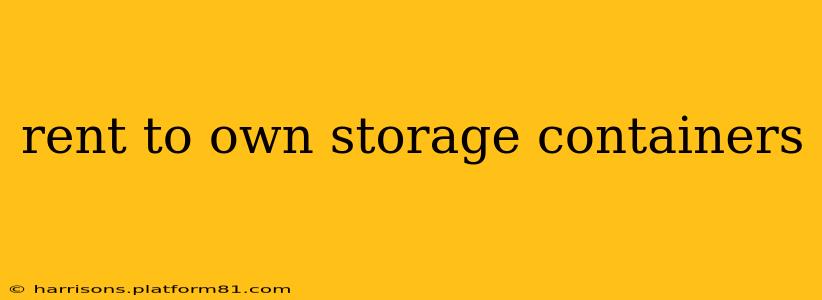Finding affordable storage solutions can be a challenge. Rent-to-own storage containers offer a unique approach, blending the flexibility of renting with the eventual ownership of a valuable asset. But is it the right choice for you? This comprehensive guide explores the ins and outs of rent-to-own storage containers, helping you make an informed decision.
What is a Rent-to-Own Storage Container?
Rent-to-own storage containers operate similarly to other rent-to-own programs. You pay a monthly fee to lease a storage container, with a portion of each payment applied towards the purchase price. After a specified period, usually determined by a contract, you own the container outright. This model offers a pathway to ownership without the immediate large upfront cost of buying a container outright.
Are Rent-to-Own Storage Containers a Good Investment?
Whether a rent-to-own storage container is a good investment depends heavily on your individual circumstances and needs. Several factors contribute to its overall value proposition:
- Cost Comparison: Analyze the total cost of renting to own versus purchasing a container outright. Factor in interest charges or fees associated with the rent-to-own agreement. Compare this total cost with the purchase price of a similar container from a retailer or supplier.
- Long-Term Storage Needs: If you anticipate needing storage for an extended period, rent-to-own might be advantageous. The eventual ownership offsets the cost of long-term rental fees.
- Financial Situation: Assess your current financial situation. If you lack the capital for a one-time purchase, rent-to-own might be a more accessible option.
- Container Quality: Investigate the quality and condition of the containers offered. Ensure they are in good working order and suitable for your intended use.
What are the Benefits of Rent-to-Own Storage Containers?
- Accessibility: Rent-to-own programs often have more lenient financial requirements than traditional loans, making them accessible to a wider range of individuals.
- Flexibility: You gain control over your storage solution without a significant initial investment.
- Ownership Potential: Ultimately, you will own the container, providing a valuable asset for future use or resale.
- Tax Advantages (Potentially): Consult a tax professional to determine if any potential tax deductions exist for your specific situation.
What are the Drawbacks of Rent-to-Own Storage Containers?
- Higher Overall Cost: In many cases, the total cost of rent-to-own will exceed the initial purchase price due to interest and fees.
- Contractual Obligations: You'll be locked into a long-term contract. Early termination penalties might apply.
- Limited Options: Rent-to-own programs might offer fewer container sizes and types compared to direct purchase from a retailer.
- Potential for Damage: You're responsible for the container's condition throughout the rental period. Damage beyond normal wear and tear might incur additional costs.
How Much Does a Rent-to-Own Storage Container Cost?
Costs vary considerably depending on factors such as:
- Container Size: Larger containers naturally cost more.
- Container Type: New or used containers will impact the price.
- Location: Geographic location influences pricing.
- Rental Company: Different providers have different pricing structures. Shop around to compare offerings.
Where Can I Find Rent-to-Own Storage Containers?
Several companies offer rent-to-own storage container programs. Research different providers to compare pricing, terms, and container conditions. Online search engines can be a great starting point for finding local options.
What are the Alternatives to Rent-to-Own Storage Containers?
- Traditional Storage Units: Consider renting traditional storage units if you need short-term storage or have a limited budget.
- Buying a Used Container: Purchasing a used container directly can be more cost-effective than rent-to-own programs in some circumstances.
How Long Does it Take to Own a Rent-to-Own Storage Container?
The timeframe for ownership varies according to the contract. Some programs might take several years, while others might offer shorter-term options. Carefully review the contract's terms to understand the complete timeline.
By carefully weighing the benefits and drawbacks, and researching different providers, you can determine if a rent-to-own storage container is the right solution for your storage needs. Remember to read all contracts carefully before signing.
